From SPPG to PPPK: The Dynamics of Program-Based Staffing in Indonesia’s Civil Service Reform
The government’s decision to appoint personnel from the Nutrition Fulfillment Service Unit (SPPG) as Government Employees with Work Agreements (PPPK),…
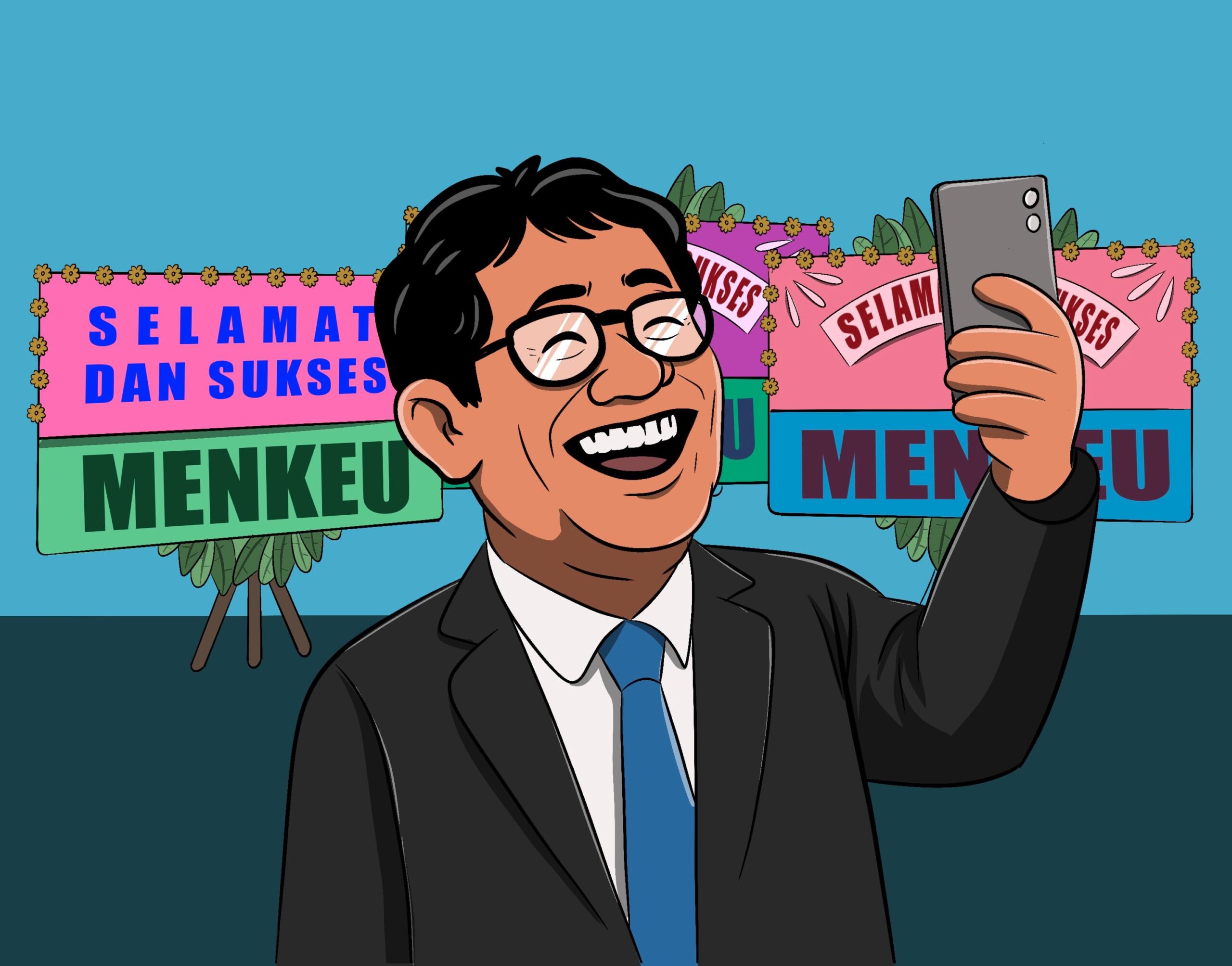
That afternoon, a call came to the phone of Purbaya Yudhi Sadewa, then head of the Indonesia Deposit Insurance Corporation (LPS). The caller informed him that he would be sworn in as Minister of Finance within two hours. Purbaya didn’t take it seriously, joking to reporters, “I thought it was a prank.”
But it was true. At 14:00 WIB, Purbaya was officially inaugurated, replacing Sri Mulyani Indrawati as Finance Minister in a cabinet reshuffle at the State Palace on Monday, 8 September 2025. Also sworn in were Mukhtarudin as Minister of Migrant Worker Protection, Ferry Joko Yuliantono as Minister of Cooperatives, Irfan Yusuf as Minister of Hajj and Umrah, and Dahnil Anzar Simanjuntak as Deputy Minister of Hajj and Umrah.
Purbaya’s early days were far from smooth. Amid public anger toward the government after a major protest that claimed the life of Affan Kurniawan, Purbaya’s son caused an online stir by posting an Instagram Story celebrating his father’s appointment and joking that he had ousted “CIA agent Sri Mulyani.”
It was meant as harmless “shitposting,” but as the child of the new Finance Minister, Yudo Sadewa quickly learned that every action would now draw scrutiny. The post was deleted, and Yudo issued a public apology video.
That same evening, Purbaya himself made a gaffe at his first press conference. Flanked by Deputy Minister Thomas Djiwandono, he said the 17 + 8 public demands came only from “a small segment of society” and would disappear naturally once the economy reached 6–7 percent growth. At that level, he argued, “people will be too busy working and eating well to protest.”
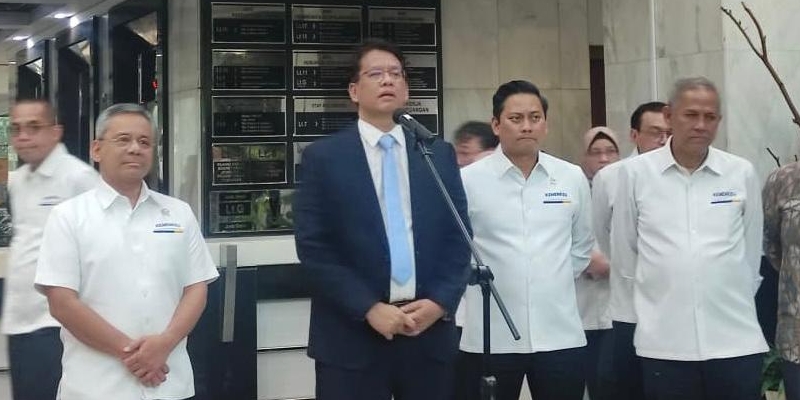
The moment was captured perfectly by rmol.id: Thomas Djiwandono was seen covering his mouth tightly beside Purbaya—as if signalling his boss to stop talking amid a politically sensitive climate.
Within two days, the media dubbed Purbaya “the cowboy minister” for his blunt, unpredictable remarks—unlike his conservative predecessors. Parliament’s Commission XI quickly warned him to be more cautious. In a subsequent hearing, Purbaya promised to adjust his tone, reading prepared remarks instead of improvising.
For the government, his off-the-cuff honesty was both refreshing and risky, especially after several ministers’ insensitive comments had sparked mass protests. For Purbaya, though, this was nothing new—his candid speaking style had long defined his public persona. Mahfud MD, former Minister of Law and Human Rights, praised him as “progressive, brave, and down-to-earth.”
To the business community, Purbaya’s appointment injected optimism for looser fiscal policies, especially in the tobacco sector, long burdened by high excise taxes. On his first day, shares of HMSP, WIIM, and GGRM soared to their upper limits on expectations of friendlier policy.
Under Sri Mulyani, tobacco excise (CHT) had increased 10 percent annually, lifting state revenue but hurting the industry. By July 2025, CHT revenue reached Rp 121.98 trillion, up 9.6 percent year-on-year, while Gudang Garam posted its first loss in history—profits plunging 87 percent.
Calling the 60 percent tax burden “a Pharaoh to the industry,” Purbaya vowed no tax hike in 2026 and intensified action against illegal cigarettes via Customs and online-market enforcement.
He also faced backlash from regional governments over cuts to intergovernmental transfer funds (TKD), which he later restored from Rp 650 trillion to Rp 693 trillion, ensuring social and political stability.
Another bold yet controversial step was placing Rp 200 trillion of state funds in state-owned banks (Himbara) to stimulate cheap credit. Critics like Bhima Yudistira and Didik J. Rachbini called it reckless and even “violating three laws,” warning of loan defaults during weak demand.
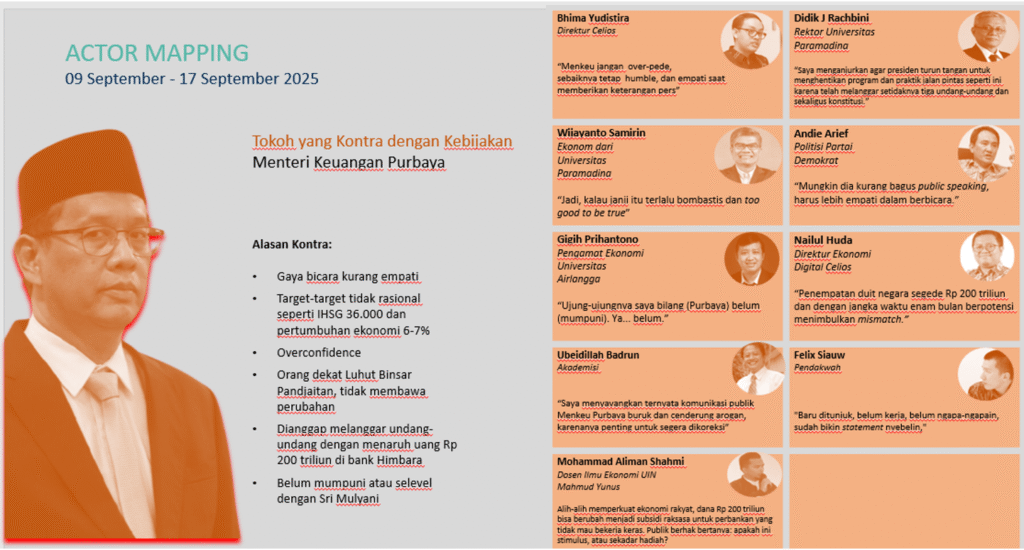
Jangkara’s actor-mapping analysis identified 8 economists and public figures critical of Purbaya and 13 supporters. Among his backers were former President Joko Widodo and Luhut B. Pandjaitan, Chair of the National Economic Council, as well as major tobacco tycoons relieved by his excise freeze.
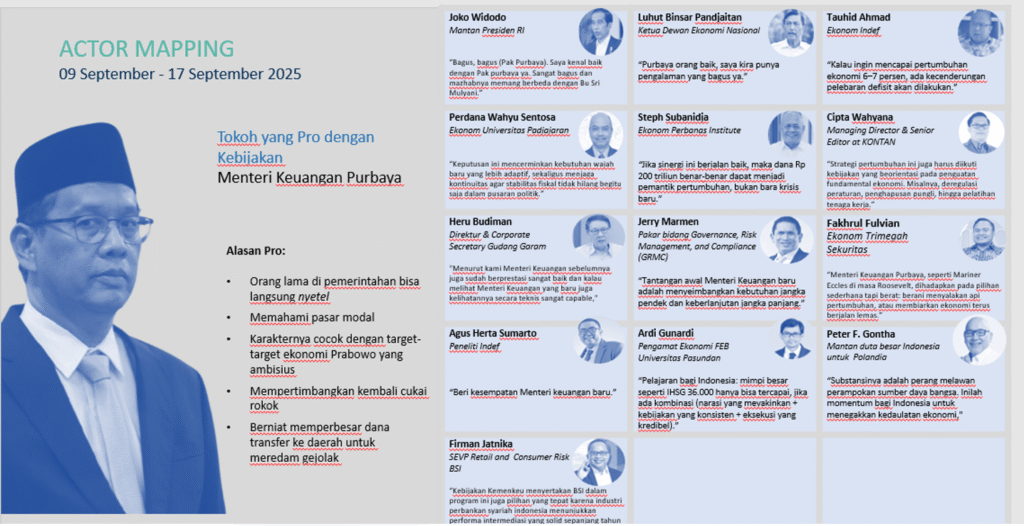
Economist Fakhrul Fulvian of Trimegah Securities even likened Purbaya to Marriner Eccles, the US Federal Reserve chair credited with rescuing America’s economy after the Great Depression—hoping Purbaya could do the same for Indonesia.
Interestingly, Purbaya’s blunt style—seen as dangerous by elites—won over the public.
Social-media big-data analysis by Socindex (8 Sept – 8 Oct 2025) found 24,444 posts, 932,776 comments, and 3,853 retweets mentioning “Purbaya”. Engagement peaked during his appointment week due to both his and Yudo’s controversies.

Early skepticism was high—many felt the new minister talked too much without results—but gradually sentiment turned positive as his candor resonated with citizens tired of bureaucratic jargon.
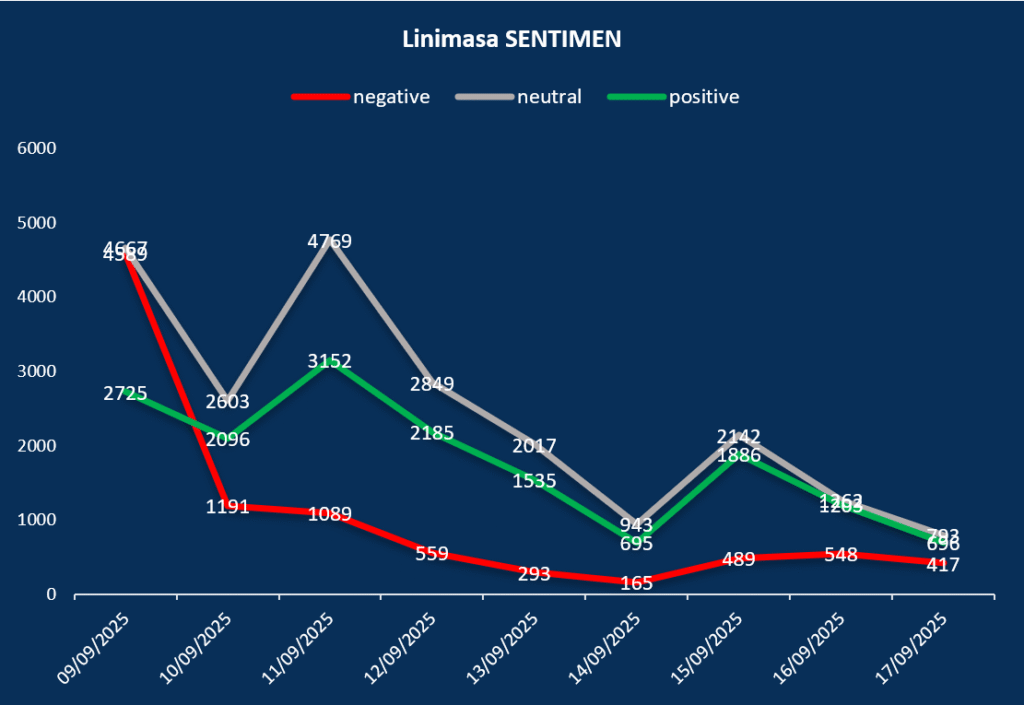
The most-liked tweet (13,000 likes) came from @tanyakanrl, mocking Yudo’s classist remarks, while the second most-liked tweet, from @mohmahfudmd, praised Purbaya’s tax and customs reforms.
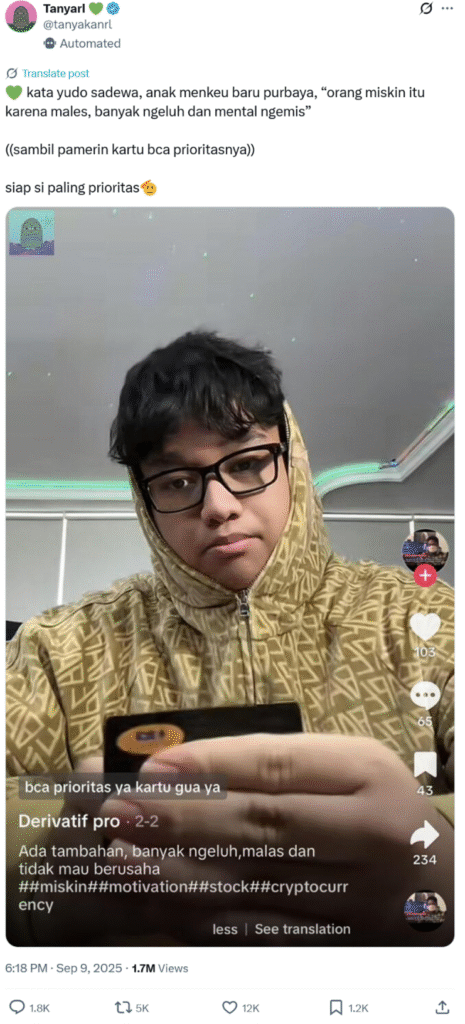
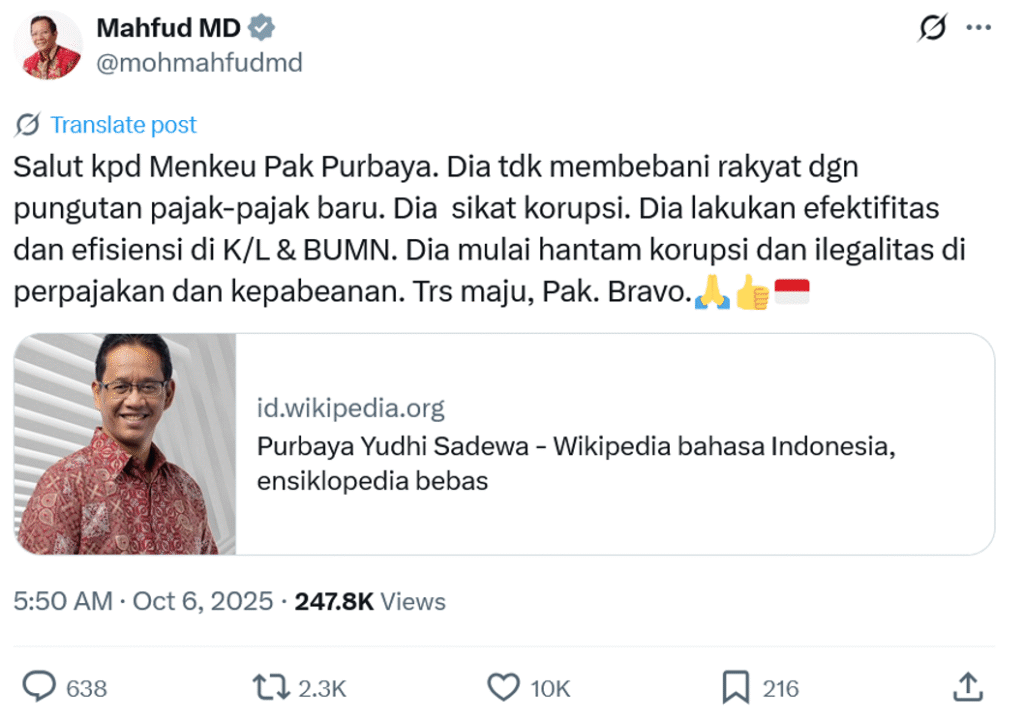
Socindex’s bot analysis confirmed that most conversations about Purbaya came from real human accounts, not coordinated campaigns. From 47,558 posts analyzed, 34 percent were positive, 20 percent negative, and 46 percent neutral.
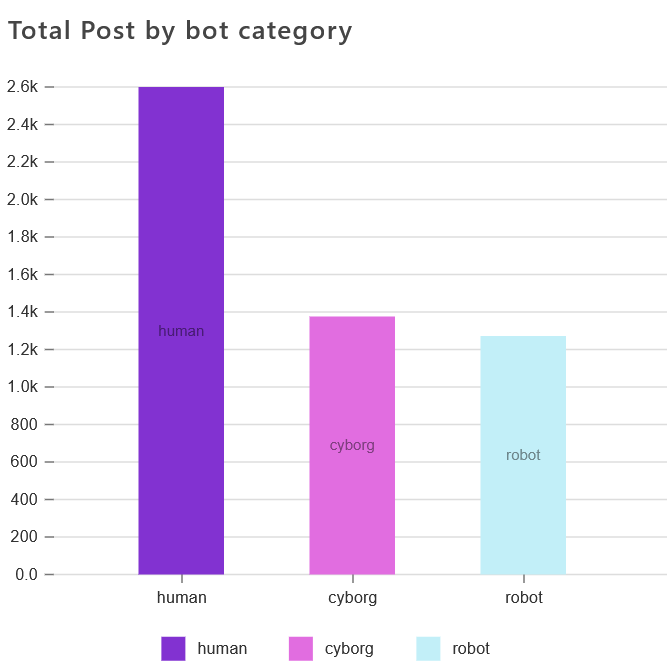
Many netizens who once mocked him now praised his “honest cowboy style.” They appreciated how he translated technocratic jargon into simple language the public could understand.
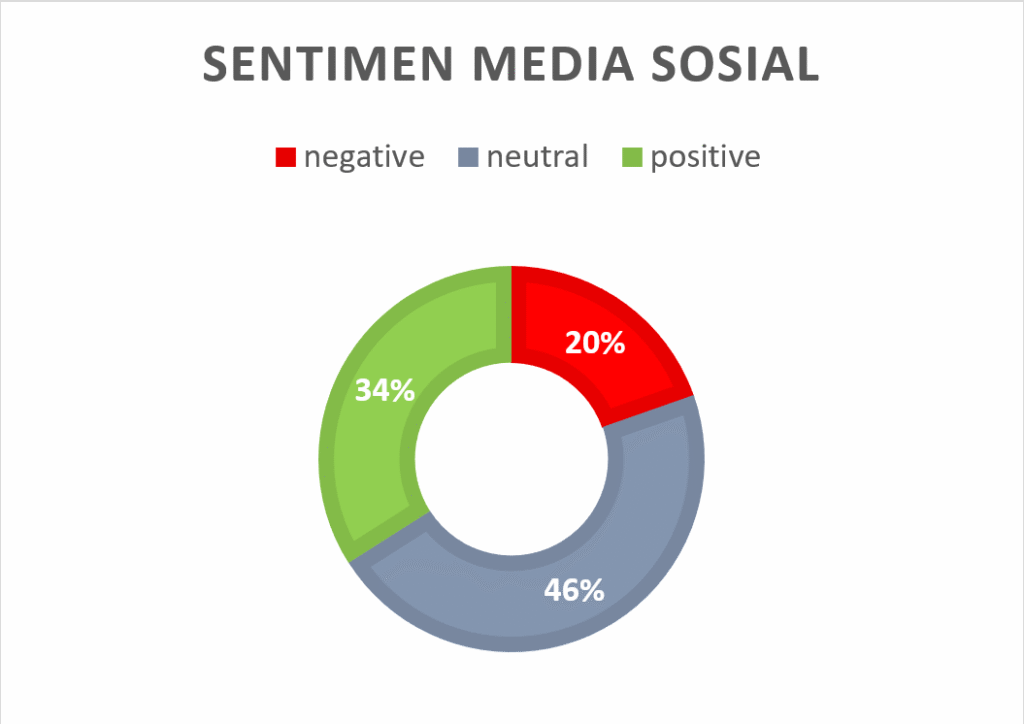
Purbaya stumbled on day one, earning labels of “arrogant” and “insensitive.” Yet, without changing his personality, he turned those criticisms into support through consistency, relatable communication, and pro-people policies.
His journey shows how authenticity and courage—paired with data-driven strategy—can rebuild trust in leadership.
The government’s decision to appoint personnel from the Nutrition Fulfillment Service Unit (SPPG) as Government Employees with Work Agreements (PPPK),…
The evolution of marketing over the past few years has shown a major shift, especially as digital marketing becomes the…
Freedom of opinion and expression is a constitutional right protected by law. Today, the public’s channel for voicing disappointment toward…
In January 2026, the internet was shaken by the viral spread of a book titled “Broken Strings: Fragments of a…
The government has begun outlining the direction of the 2026 State Budget (APBN 2026) amid ongoing global economic uncertainty. Finance…
The Indonesian government, through the Ministry of Communication, Information, and Digital Affairs (Komdigi), has officially temporarily blocked the use of…
A few years ago, electric cars still felt like a far-off future. They were seen as expensive, futuristic in design,…
Hydrometeorological disasters hit three provinces in Sumatra—Aceh, North Sumatra, and West Sumatra. Tropical Cyclone Senyar, spinning in the Malacca Strait,…
The heavy rainfall in late November 2025 caused flash floods that submerged parts of Aceh, West Sumatra, and North Sumatra….
When we consider people’s decisions today—what to buy, what issues to trust, and which trends to follow—one thing often triggers…